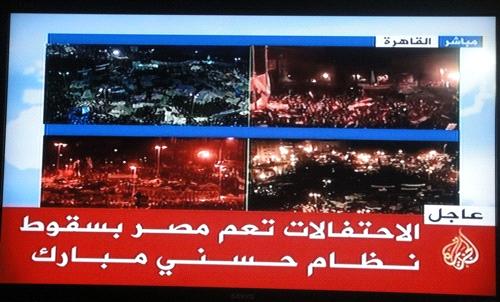Ammon News - By Taylor Luck
Mubarak is gone and Egypt has regained its rightful place as a leader in the Arab world. Hold your applause.
Despite the euphoria that is rushing from the streets of Cairo to the edge of Saudi Arabia, the revolution that began when a handful youths walked onto Tahrir Square on January 25 is far from finished.
This not a political revolution, not a movement to tear down a rotting regime, or to root out corruption to open economic opportunities for the masses. The revolution that is currently taking shape is the earth-rattling groundswell of people power fundamentally shifting media in the Middle East.
For years, when reaching for news on the latest developments in the region, young Arabs have been forced to choose between western media prone to Orientalism and sensationalism and news outlets at home that have been so soft contained, Arab governments would likely print more daring publications.
Nothing exposed this media gap than the Egyptian revolution. While all eyes were on an entire nation demanding basic human rights and freedoms that have not been respected in the region for decades, traditional Arab news outlets were embarrassingly late in tackling the issue.
Most Arab newspapers and state broadcasters spent nearly two weeks grappling with the subject, waiting for their governments to craft their official stances and draw the lines in the sand to know where not to venture.
By all means, the Western media fared little better, failing to capture When CNN’s Anderson Cooper was shoved by a handful of shabab near Tahrir, the incident made international headlines, while the brutal murder of graphic designer Khaled Said by Alexandria police, the assault which planted the seed of the movement several months ago, went largely unreported.
With history unfolding before their eyes, many European and American newspapers chose to focus on the ‘horror’ stories of tourists whose holidays were rudely interrupted while the brave men and women in Tahrir Square stared down police batons, rocks and Molotov cocktails.
For days, pundits debated whether the Muslim Brotherhood would form an ‘Islamic state’ in Egypt, completely missing the fact that Islamists were latecomers to the movement, and that people such as Wael Ghonim, younger, non-politically aligned Egyptians who led the #January 25 movement, were going missing and languishing in detention centers.
In Arab media, there was one victor. As the masses in Tahrir square bulged, Al Jazeera kept the camera rolling and was transformed into a pillar of people of power. But despite its valiant coverage of the revolution, question marks remain over the Qatari station’s partiality.
Only a few weeks before it was upholding the freedom of the press against Mubarak’s thugs, Al Jazeera was under criticism for its release ‘Palestine Papers,’ which some claimed were designed to embarrass the Palestinian Authority. Its sometimes uneven coverage in Lebanon even made an Al Jazeera vehicle a target of protesting Saad Hariri supporters in Tripoli who viewed them as sympathetic to Hezbollah.
Even now, with its bolstered credibility, few believe that the network would be so enthusiastic in its coverage should such protests reach the streets of Doha.
With traditional media offering few outlets to express their views, Egyptians did what any young people would do: they went online. Tech-savvy Egyptians spurned newspapers and chose Facebook to announce the revolution several days before January 25, turning Tweets and hashtags into their foot-soldiers of change.
In 140 characters or less, protestors on the ground captured the spirit of the movement better than the tomes of analyses so-called experts and columnists in both the Arab and Western worlds. They used social media to lend support, warn against violence and prevent political movements from hijacking the revolution.
For once, young people in the region had had their voices heard across the globe, without having it distorted by the filter of western journalists trying to ‘earn some cred’ and Arab columnists whose glory days went with times of Jamal Abdul Nasser.
As the Egyptian military now prepares for a transition into a civilian government and the debate how to best built a modern Egyptian state begins, the future of this media #revolution is uncertain. Whether tweets, Facebook messages, blog posts and reader comments can be cobbled into a credible news agency that can report accurately in a region where so many failed has yet to be seen.
But what is clear is that as the new media takes shape, for Western and Arab outlets, it is business as usual.
Already the West is obsessed with the “who’s next game,” speculating over and the situations in various Arab countries while completely overlooking the root causes of social discontent: unemployment, rising prices, corruption.
In the Arab world, the press also seems content to be on the wrong side of history. Saudi Arabian media have still yet to report on citizens’ demands to form the country’s first political party, a tidbit which has already made the rounds across the Internet and satellite stations. In Jordan, one day after Ammon News Website was hacked into and brought offline, some lawmakers called for greater regulation of online media.
As regional governments rush to enact reforms to prevent social unrest, media outlets both East and West have failed to learn their lesson of January 25: it is not what you report, but what you refuse to overlook, which proves your credibility.
With social media clarifying the lines between reality and the printed word, young Arabs finally took matters into their own hands and circumvented a media which long turned a deaf ear to their plight.
If this movement continues after the last protestor is escorted out of Tahrir, the status quo for journalism in the Middle East may soon go the way of Mubarak.
And that, for once, is news fit to print.
* Taylor Luck contributed this article to Ammon News
